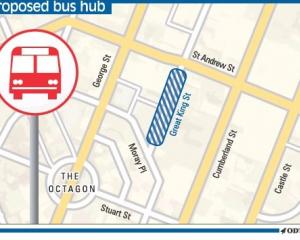It is too simple to blame parents for their children being out in the streets at night, those who work with young people and their families in Dunedin say.
Police Youth Aid officers, staff from social agencies and legal advisers say most Dunedin parents whose children are staying out at night and getting into trouble want them to stay home and be safe.
But many are at their wits' end, or simply do not know how to keep their child out of trouble.
Very few parents do not care about their children, they say.
Groups of aggressive young people on Dunedin's streets late on weekend nights recently have prompted residents and police to raise concerns about the situation.
It was reported in the Otago Daily Times yesterday that a group of Otago University graduands were assaulted in George St by a group of teenagers early one recent Saturday.
One of them was taken to Dunedin Hospital with a broken nose, concussion and a back injury.
Some commentators questioned where the children's parents were when these incidents were happening.
Otago Youth Wellness Trust practice manager Vicki McDermott said, in most cases when young people were behaving badly, there was not one simple reason why that was happening.
Parents sometimes did not have the skills or knowledge to recognise or deal with those issues.
Young people needed good relationships not only with their parents but with other people, and it was too simple to wholly blame the parents of young people for their actions.
"We all have a part to play, whether you are the parent, the teacher, the person down the street.
"There are multiple layers of responsibility."
Dunedin's Community Law Centre co-ordinator, Caryl O'Connor, said the centre regularly received calls from parents worried to the point of desperation because their child was behaving badly or mixing with an unruly crowd.
"They are desperate to help their children, but are not sure where to go."
The law centre's advice was usually for parents to approach other individuals and services for help, including GPs, the Otago Youth Wellness Trust and the child's school, where guidance counsellors and deans might be of assistance.
Sometimes, parents just had "to bite the bullet" and contact Child, Youth and Family, she said.
Medical reasons for a child's behaviour were often overlooked.
"I have learned that when kids are behaving like this, a lot of it's to do with being absolutely miserable and that misery needs to be looked at," Ms O'Connor said.
Youth Aid Sergeant Kevin Davidson said most parents of the 1500 young people the section dealt with each year did worry about their child, even if they had reached a point where they could no longer cope.
Only a few parents did not care what their child was doing.
Unfortunately, it was those youngsters who committed the worst offending and were often the ones who ended up with care and protection issues.
There was a gap in the legislation when it came to dealing with the parents of such children, but a Bill before Parliament could help by giving the Youth Court the power to require the parents of young offenders to attend a parenting education programme for a maximum period of six months.
The social services select committee is due to report back on the Bill this week.
Police could help parents of children who went out at night or otherwise refused to obey their parents, Sgt Davidson said.
"To call us and say `hey, I need some help' it takes an enormous amount of courage and strength, and any call we get like that we treat very seriously."
There were also multiple other agencies that could help.
Parents did not need to fear something undesirable would happen to them or their child.
"The whole point of the [law] we work under [the Children, Young Persons and their Families Act] is to strengthen families and not break them up."
In some cases, that meant getting Child, Youth and Family involved, but in those cases the aim was to have families operating as a strong unit again as soon as possible.
Regarding young offenders, the law aimed to hold them accountable for their crimes, including the impact on their victims, and address the issues they faced.








